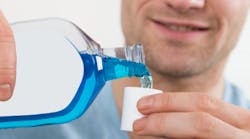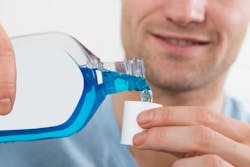Mouth rinse mania: How hygienists can reconcile concerns over alcohol rinses
By Chris Bustamante, RDH
As a health-care professional, it can be hard to distinguish between what is right and what is wrong. What do we recommend and why? A balancing act at best.
Often, we have to ask ourselves: Is there clinical evidence that can help us overcome our feelings about a treatment or intervention? What is the standard of care, and what do ADA Guidelines dictate? What are my patient’s constraints, physically, mentally, and socioeconomically?
It goes back to individualized care.
While I found no evidence or news regarding an outright ban by our ally, there was a 2008 study in the Australian Dental Journal that found a “sufficient correlation” between the use of alcohol rinses and the development of oral cancer.(1)
The study cited epidemiological evidence between alcohol use and oral cancer. It postulated the mechanism of action from in-vitro animal studies, stating that alcohol hampers the mucosal barrier by affecting the lipid layer and thus causing permeability. The byproduct of alcohol metabolism, acetaldehyde is a known mutagen and thus, long-term use resulted in mucosal atrophy and hyper-regeneration.
This fancy lingo basically states that the alcohol component irritates the membrane so much that it breaks down cellular walls and can have carcinogenic effects. Despite these small studies, the exact mechanism could not be concluded.
The study then provides supporting evidence form other studies, some dating as far back as 1983. The most compelling of them is a multi-centric case control study from 2007, in which 3,210 patients with head and neck cancer and 2,752 controls found that they self-reported daily mouthwash use (OR 3.40; 95% CI = 1.96, 5.89). Of those with oral cancer only and not including head and neck cancers, it stated that people who used mouth rinses containing alcohol twice per day, increased their chances of getting cancer by nine times if also a smoker, over five times if also a drinker, and nearly five times if they did not drink or smoke.
It’s a lot of jargon, but to put it simply, for those who don’t drink, don’t smoke, but use alcohol rinse:
· Head and neck cancer is three times more likely
· Oral cancer alone (nearly five times more likely)
Wowzer!
If looking at that study alone, one might be shocked enough to sound the alarm of reason, call your local senator, appeal to the ADA to ban the stuff altogether, or at very least go after those companies who are making them!
And that’s exactly what “they” did.
Oral Cancer Prevention International, the maker of the Oral CDx Brush Test, filed a $60 million lawsuit against the makers of Listerine, Johnson and Johnson, citing the 2008 Australian study as evidence of concealment. While many rinses have alcohol, the Listerine brand is the only one that exceeds 26% ethanol in its products.
The manufacturer became enemy #1. With sales exceeding $1 billion annually, the Listerine brand has quite the following, and Johnson & Johnson had a high market product to defend. The lawsuit itself wasn’t against the Listerine brand, but rather that Johnson & Johnson wanted to keep the possibility of the claims quiet—a business conflict of interest. It was resolved between both companies sometime thereafter.
So, what does the ADA say? In 2009, an official statement was that “available evidence” does not support a link between alcohol rinses and cancer. If you’re like many people, the words “conspiracy theory” comes to mind.
Who is getting paid off? Right? Well, not so fast.
Although there have been a few studies, such as the Australian study, that show a possible correlation, a 2012 meta-analysis published in the Annals of Agricultural and Environmental Medicine determined that there is no supporting evidence. In the analysis, 18 studies were included to find no statistically significant association between the use of alcohol-based mouthwash and the risk of oral cancer. The findings included a RR=1.16; 95% CI (0.44, 3.08) and a risk in daily usage of (p=0.11) (2)
I repeat! Despite compiling 18 different studies, there was no supporting evidence! That’s quite the find!
So where does that leave us? It feels like limbo, but it shouldn’t.
Part of you might be thinking, “But it just seems so plausible.”
As clinicians, with our patient’s best interests in mind, we have to look past our feelings and really remind ourselves of what constitutes evidence-based care.
It can be hard to break old habits. Every year, research evolves and protocols change. Take the new guidelines by the ADA on prosthetic premedication, for example. It’s hard for many of us to let go of old norms. We resist and want to protect ourselves and our patients to the fullest extent, even if it’s not supported by evidence.
When it comes to rinses, I personally have really fallen in love with the Listerine Zero product. It has all the benefits of the essential oils, but without the alcohol concern. Granted, I know now that my concerns are subjective at best.
Each of us as individuals have to dig deep and evaluate ourselves and our biases—careful to incorporate just the right amount of personal belief into the process. Most importantly of all, never stop learning or questioning norms.
That’s how groundbreaking discoveries are made!
Chris Bustamante, RDH, is a traditional dental hygienist in Denver. His passion for research and his love for writing have transformed his life both personally and professionally. While working toward completing his first science fiction novel, he writes on his personal blog and for various publications. He can be contacted at [email protected].
References
- McCullough M. and Farah C. (2008), The role of alcohol in oral carcinogenesis with particular reference to alcohol-containing mouthwashes. Australian Dental Journal, 53: 302–305. doi:10.1111/j.1834-7819.2008.00070.x
- Gandini S, Negri E, Boffetta P, Negri’ M, La Vecchia C, and Boyle P. Mouthwash and Oral Cancer Risk – Quantitative Meta-analysis of Epidemiologic Studies. Annals of Agricultural and Environmental Medicine 2012, Vol 19, No 2, 173-180.
- Holroyd J. Listerine Cancer Claim Trigger Court Battle. The Sydney Morning Herald. 2011 Aug 29. Retrieved from: http://www.smh.com.au/lifestyle/beauty/listerine-cancer-claim-triggers-court-battle-20110829-1jh63.html
- Ramesh R. Johnson and Johnson Sued Over Mouthwash Cancer Fears. The Guardian. 2011 Aug 27. Retrieved from: https://www.theguardian.com/world/2011/aug/27/johnson-johnson-sued-mouthwash-cancer-fears







